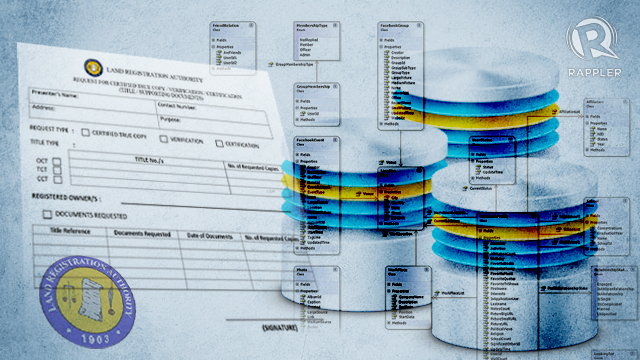SUMMARY
This is AI generated summarization, which may have errors. For context, always refer to the full article.

MANILA, Philippines – When the surveyor advised Jennifer (not her real name) to get a fixer to help facilitate their application to have their properties titled, it seemed like a reasonable idea.
At that time, she had already spent 6 months going to and from various government offices for the procedural requirements for land titling. She was hard pressed to finish the process as soon as possible so she can join her husband, Ramon, who had to go back to his job in Canada.
The surveyor told Jennifer that he knew an employee of the Land Registration Authority (LRA) who could help her with her problem. Jennifer went along, thinking she would only give the employee “pangmerienda (snack money).”
She later balked at the cost: P1,000.00 ($19.88) for each of the 7 land titles she was processing, released within 3 days.
Delays lead to corruption
Jennifer’s complaint is one of almost 3,500 reports received so far by #NotOnMyWatch, an anti-corruption platform developed by Rappler. It was Jennifer’s brother who filed the complaint on her behalf.
Her case shows how people are typically lured by fixers who take advantage of those having difficulties in processing land titles.
A number of factors allow the fixers to thrive. To begin with, not everybody is familiar with the land titling process, which involves transactions with multiple government agencies.
Delays are common due to the sheer volume of transactions at these agencies.
In 2016, the LRA issued about 762,530 land titles and released around 1.7 million documents including certified true copies, certifications, and verification documents. On top of that, it released 4.8 million other documents related to land titling.
Systems were computerized in 2008 to address the backlog. But years after computerization, the LRA Statistics Office said the agency still had a backlog of about 468,436 pending requests from 2016.

Opportunities for corruption are created when there are delays, admits Robert Leyretana, LRA OIC Administrator. In the past, he said, unscrupulous employees would ask exasperated applicants,”You want to fast-track this?”
“Package deals,” where fixers deal with multiple agencies on behalf of the applicant were also common, he added. Fixers are either insiders or outsiders who loiter within the premises of the Registers of Deeds (RD), which handle the land titling applications in provinces and cities.
It’s a problem that the LRA has called out repeatedly in memoranda released in 1995, 2002, and 2003. These circulars warned the employee against engaging in the said “package deals.” An employee may be investigated, and once proven, administrative cases will be filed against the person.
Is automation the key?
Leyretana denies that the problem still persists. Fixers no longer hold sway at the LRA, he said.
“You won’t see anybody who is not connected with the office having personal business inside,” he said.
Apart from addressing delays, the Land Titling Computerization Project, which computerized all business processes in the agency, was also supposed to solve the issue.
The system connects the central office of the LRA in Quezon City with all 167 RDs nationwide in real time. (READ: What’s in the LRA database?)

Leyretana said this computerized system reduces discretion on the part of the staff of the RD. “The processes are streamlined; the requirements are uniform. There will be no room for other additional requirements or delays.”
Prior to this, Leyretana said each RD had its own process. This created opportunities for manipulation. Now, an applicant cannot just skip a particular step.
The system also reduces contacts between the client or applicant and LRA personnel. “No personal contact, no offer. Hence, no bribery,” Leyretana explains.
The status of requests can be monitored through an online tracking system, which also informs an applicant on the next steps to take, making the process clearer.
The step-by-step process on how to request for a land title at the LRA follows:
- Entry: The client has to give the required documents for the RD staff to enter in their database. A tracking number is given to the client, which can be used in following-up on the request.
- Payment: The fees to be paid are posted on the LRA’s Citizen’s Charter. All transactions should have receipts.
- Encoding: All documents given to the RD staff are encoded in their system.
- Examination: The encoded information are checked vis-a-vis the physical copies initially given to the RD staff.
- Approval of the Register of Deeds: All encoded information are forwarded to the specific RD, to which the lawyers will give their approval.
- Printing: The issued title is printed.
- Uploading of documents: All documents are scanned so that they become part of database and are not lost.
- Releasing: The issued title is given to the client.
For every transaction, the employee should just tick the requirements already submitted.
Leyretana said the processing of papers in the LRA should take 10 days at most, provided that requirements are complete.
Simpler requests, like certified true copies, should only take 3 days because a client will only have to go through steps 1, 2, and 8. (READ: #NotOnMyWatch: How to transfer ownership of inherited land)
However, there are exemptions to this 10-day rule – requests that would require documents aside from the mandatory requirements. For this, the processing time depends on when the applicant can give the other documents. Once completed, then the 10-day rule should be applied.
In Jennifer’s case, the papers of the owners of the subdivided land will need to be fixed first before she can get her Transfer Certificate of Titles.
Jennifer’s brother said they have called the LRA to report the fixer. They refused to give other details about the case.
No negotiations allowed
Leyretana admits that corruption is still possible even with the new system, but he appealed to the public not to fall for it.
“At the point of approval, the RD approving officer will determine whether your Deed of Sale or Real Estate Mortgage is registrable or not. When he says it’s not registrable, then he will issue a Notice of Denial. That’s where the [physical] contact happens because you will explain the grounds for denial,” he explained.
If there are issues with regard to the Notice of Denial, a client should immediately escalate it to the central office and not make compromises with the RD staff, Leyretana said.
“We will resolve whether or not the RD is correct in denying you a title. When we tell the RD to sustain your denial, therefore you won’t be able to register your Deed of Sale. If we say that the RD is wrong, then you go back to your RD and have your registration completed,” he explained.
‘Imperfect system’
LRA human resource chief Eva Adiento also admitted that the project is still imperfect, with the system sometimes slowing down. In fact, delays are still among the most common complaints they receive.
While RDs located in far-flung areas can process documents in a matter of hours, in highly populated areas like Quezon City or Makati City, it would take days, according to Leyretana.
Adiento also said there are times when their office receives more requests than their staff could handle.
One unit with more or less 15 to 20 people, for instance, would sometimes get 160 requests in a day. “So it cannot be processed immediately,” Adiento said.
Not all RDs are covered by the computerization project. The RDs in these areas are not yet computerized: Tuao municipality, Silay City, Cadiz City, Dapitan City, Batanes, Sulu, Tawi-Tawi, and Basilan.
Leyretana said this is due to any of the following reasons: security, lack of telecommunications facility, or lack of a proper office site.
‘Aksyon Agad’
The LRA ranked 4th among agencies that had the most number of Anti-Red Tape Act (ARTA)-related complaints from August to September, according to a Civil Service Commission report released in 2016.
By January 2017, LRA ranked 2nd, which alarmed Leyretana. He found out that the reports lodged through the hotline were distributed to 4 other action centers, depending on the agency.
“By the time these complaints were transmitted to us, 3 to 4 months have already passed. No actions were done. So these complaints fired up, without us doing any action,” Leyretana explained.
To be able to act on complaints immediately, the agency launched the “LRA Aksyon Agad Center” in February. It is similar to the 8888 hotline, but is directly manned by employees of LRA. There is a call center for Luzon, Visayas, and Mindanao, Leyretana said.
Reports gathered by the main office are forwarded to the concerned RDs. Upon acting on the complaints, the RDs report the status to the main office. Aksyon Agad then updates the complainant.
The central office monitors it at the end of the day, through a “monitoring matrix.”
“Once you did not act on it within a certain period, I will issue a memo. Once the memo is issued and still no action has been done, an administrative case will be filed,” Leyretana explained.
Since the launch, most of the reports are focused on follow-ups on their requests, Leyretana said.
Bobby Bautista, LRA’s public relations and information section chief, encouraged those who experienced corruption or bad service in the agency to also file a complaint to the agency’s Public Relations and Information Section.
He added that it usually takes the agency at least 5 days to act on the complaints, as prescribed by the ARTA.
“Hindi namin malilinis ang ahensiya kung wala naman nagko-complain (We won’t be able to clean the agency if no one is complaining),” Bautista said – Rappler.com
$1 = P50.30
Have you transacted with the Land Registration Authority recently? If you have any inquiries, suggestions or complaints you may call 921-1383 or text 0919 354 9809 or 0905 258 6289.
Have you seen an act of corruption first-hand? Have you ever been asked to pay a bribe? Tell us about your experience on www.fightcorruption.ph
You can also fill out the form below:
Help fight corruption. Share this story with your friends on Facebook, Twitter, and Instagram and help spread the word about how we can fight corruption together.
To help us track the ripples of this campaign, use #NotOnMyWatch.
Interested to partner with us? Email notonmywatch@rappler.com.
Add a comment
How does this make you feel?
There are no comments yet. Add your comment to start the conversation.